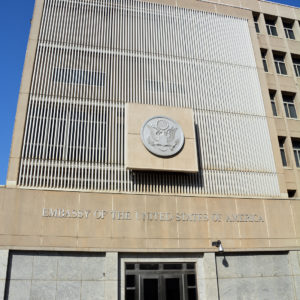After weeks of speculation that a newly sworn-in President Donald Trump could make good on his campaign promise to move the American embassy in Israel from Tel Aviv to Jerusalem, the new administration now seems to have deferred the matter, reportedly to gauge the possibility of a regional Arab-Israeli peace deal.
However, neither has the Trump administration indicated that it is reconsidering its pledge to relocate the embassy, noting only that it is “at the very beginning stages” of looking into the matter.
Although such statements will continue to fuel speculation over whether or when Trump might decide to move the embassy, the more relevant question to be asking is why the Trump administration is even considering such a move in the first place. While it may have some domestic political or cultural appeal, from the standpoint of U.S. interests, the peace process, and regional stability, moving the embassy would come at an exceptionally high cost with little or no benefit.
By relocating its embassy to Jerusalem, the United States would effectively be recognizing the city as Israel’s capital, a step that successive U.S. administrations from both parties along with virtually every country in the world have steadfastly avoided since 1948. Jerusalem remains one of the thorniest and most complicated issues in the now century-old conflict between Israelis and Palestinians, as well as a powerful political and religious symbol for billions of people around the world.
While Israel claims Jerusalem as its “eternal and undivided” capital, Palestinians consider the eastern part of the city, occupied by Israel since 1967, as the capital of their future state.
Given Jerusalem’s unique status as sacred to all three Abrahamic faiths — Judaism, Christianity and Islam — the longstanding international consensus has been that no one group should hold exclusive title to the city. This same principle has guided U.S. policy toward Jerusalem for at least the past 70 years, and even predates the existence of Israel. Its origins date back to the 1947 U.N. plan to partition Palestine into separate Jewish and Arab states, under which Jerusalem was to be placed under international control.
Any attempt to alter Jerusalem’s status outside of a negotiated settlement would therefore likely be highly destabilizing and do irreparable damage to American interests. President Obama, European Union officials and America’s Arab allies have all warned that such a move would carry dire consequences for the United States and the region. Relocating the U.S. embassy to Jerusalem would be a major boon to religious extremists in the Middle East, affirming the narratives of groups like ISIS and al-Qaeda that the United States and Israel are waging a war against Islam. In addition, the United States would be forfeiting its role as a mediator in the conflict, and according to Palestinian officials risks becoming “a direct party to the conflict.”
Those advocating for moving the embassy assert that it would have only minimal security or diplomatic fallout. They argue that relocating the American embassy to West Jerusalem would not necessarily preclude the possibility of either an independent Palestine or a Palestinian capital in East Jerusalem. However, unless the United States is prepared simultaneously to establish an embassy to the “State of Palestine” in East Jerusalem — the likelihood of which is virtually nil — it would merely be validating Israel’s exclusivist claim over the whole of Jerusalem.
Whatever pretexts are used, the reality is that calls for moving the embassy ultimately have less to do with American policy or national security considerations than with cultural and ideological ones. This was evident in Trump’s speech before the powerful American Israel Public Affairs Committee last summer, in which he first announced his intention to “move the American embassy to the eternal capital of the Jewish people, Jerusalem.” Such assertions reflect a particular worldview in which Jerusalem belongs solely to the Jewish people, or at best to “Judeo-Christian” civilization, while diminishing (or denying altogether) the city’s Palestinian, Arab and Islamic heritage.
While such views may be prominent among certain groups of conservative Christians and Jews, they do not represent the full breadth of Christian or Jewish opinion — to say nothing of the world’s 1.7 billion Muslims — on Jerusalem. More important, as the most powerful country and largest economy in the world, with interests in every corner of the globe, the United States cannot afford to make such vital foreign policy on the basis of narrow, parochial or sectarian sentiments.
In the meantime, since the issue is likely to resurface in the months and years ahead, the onus is on President Trump and his administration to explain to the American people and the world how reversing 70 years of U.S. policy while needlessly antagonizing a quarter of the world’s inhabitants advances U.S. interests, or makes Americans safer at home or abroad.

